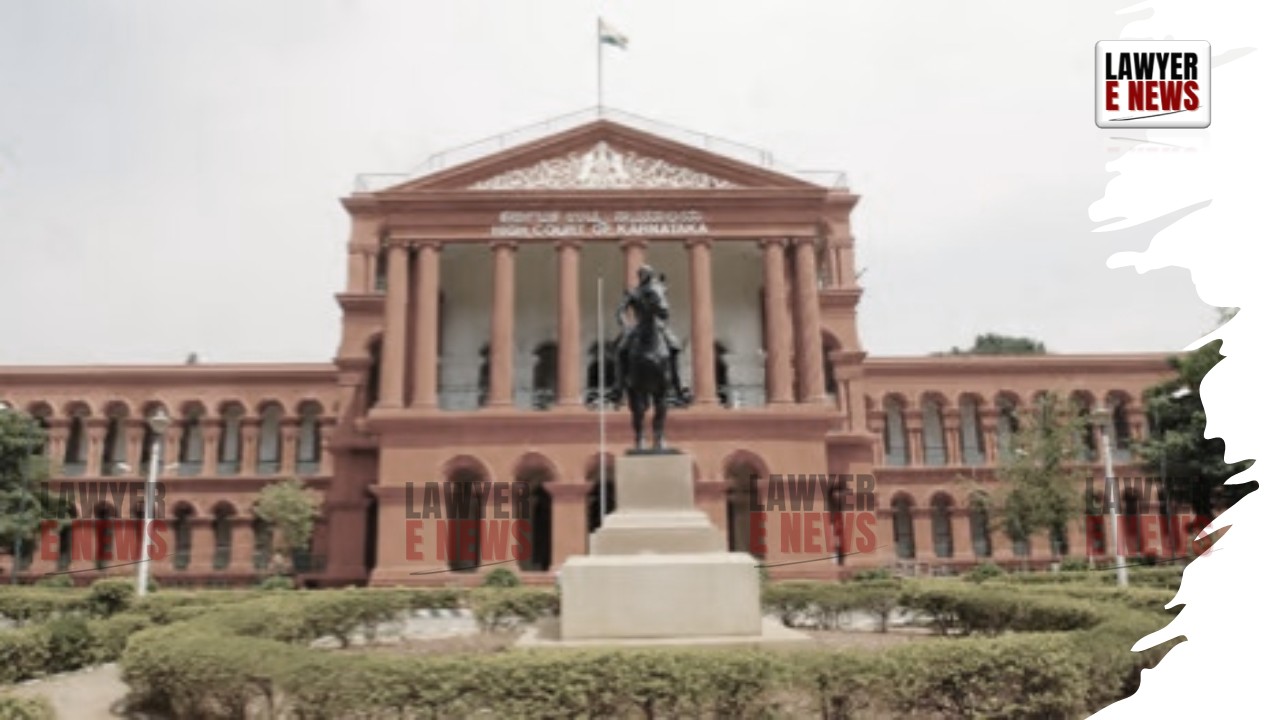-
by Admin
19 February 2026 3:14 PM



Karnataka High Court delivered a significant ruling quashing two FIRs arising from a contentious matrimonial dispute between a husband and wife. The Court held that both FIRs were retaliatory in nature and constituted an abuse of the process of law.
A Single Bench of Justice M. Nagaprasanna ruled in favor of the husband, who had challenged an FIR filed by his wife under Sections 498A and 506 of the Indian Penal Code (IPC), alleging cruelty and harassment. The Court noted that the wife had filed the complaint three and a half years after the alleged incidents without any explanation for the delay. It also found that the complaint lacked the essential ingredients of Section 498A IPC and was filed only after failed settlement talks. The Court further quashed the FIR registered by the husband against the wife and her family under Sections 420, 406, 403, 109, 384, and 34 IPC, observing that seeking maintenance through legal proceedings cannot be classified as extortion or cheating.
The husband and wife were married in 2007 and had two children. Their relationship deteriorated in 2016 when the husband allegedly discovered messages exchanged between his wife and her former boyfriend. Following continuous disputes, the wife left the matrimonial home in 2020 and relocated to Bengaluru with their children.
The wife initiated multiple legal proceedings after failed mediation and settlement discussions. On October 7, 2023, she filed a case under Section 10 of the Hindu Marriage Act, seeking judicial separation. The next day, on October 8, 2023, she filed an FIR under Sections 498A and 506 IPC, alleging that she had suffered cruelty at the hands of her husband. On October 9, 2023, she filed a petition under Section 125 of the Code of Criminal Procedure (Cr.P.C.) for maintenance, followed by a complaint under Section 12 of the Domestic Violence Act on October 11, 2023.
The husband, in response, filed an FIR on November 25, 2023, under Sections 420, 406, 403, 109, 384, and 34 IPC, alleging that the wife and her family had extracted money from him under false pretenses. Additionally, he filed a case for custody of the children under the Guardians and Wards Act and later, on November 29, 2023, filed a petition under Section 9 of the Hindu Marriage Act seeking restitution of conjugal rights.
Court’s Observations on the Wife’s FIR Under Section 498A IPC
The Court found that the wife’s FIR was filed more than three years after the alleged incidents of cruelty, without any valid reason for the delay. It observed that the complaint lacked any reference to demands for dowry, which is a fundamental requirement under Section 498A IPC. Citing the Supreme Court’s judgment in Achin Gupta v. State of Haryana, 2024 SCC OnLine SC 759, the Court held that unexplained delay in filing an FIR in matrimonial cases indicates malafide intent and misuse of legal provisions.
The Court also referred to the Supreme Court’s ruling in Abhishek v. State of Madhya Pradesh, 2023 SCC OnLine SC 1083, which cautioned against the misuse of Section 498A IPC in matrimonial disputes. The judgment emphasized that false and retaliatory FIRs undermine the credibility of genuine cases and lead to unnecessary harassment of individuals.
Court’s Observations on the Husband’s FIR Under Sections 420 and 384 IPC
The husband alleged that the wife had secured maintenance by submitting false affidavits about her financial status, thereby committing fraud and extortion. The Court categorically rejected this claim, stating that maintenance is granted by a court after due legal process and cannot be equated with extortion or cheating.
The Court relied on the Supreme Court’s decision in Dara Lakshmi Narayana v. State of Telangana, 2024 SCC OnLine SC 3682, which held that criminal law should not be misused to settle personal disputes in matrimonial conflicts. It reiterated that financial support provided under court orders does not amount to an illegal act warranting criminal prosecution.
Quashing of Both FIRs: Preventing Abuse of Legal Process
The Court applied the principles laid down in State of Haryana v. Bhajan Lal, 1992 Supp (1) SCC 335, which sets out the circumstances in which criminal proceedings can be quashed. It concluded that the wife’s FIR under Section 498A IPC was filed as a counterblast to failed mediation and was not based on any genuine grievance. Similarly, the husband’s FIR alleging cheating and extortion was not maintainable, as maintenance claims arise from legal proceedings and do not constitute a criminal offence.
Relying on the Supreme Court’s judgment in Preeti Gupta v. State of Jharkhand, (2010) 7 SCC 667, and Arnesh Kumar v. State of Bihar, (2014) 8 SCC 273, the Court reiterated that courts must scrutinize Section 498A IPC complaints carefully to prevent their misuse in matrimonial disputes. It observed that allowing such cases to proceed would not only burden the judicial system but also lead to undue harassment of individuals.
Quashing of FIRs and Judicial Caution Against Matrimonial Litigations
The Karnataka High Court allowed both writ petitions and quashed the FIRs. The FIR in Crime No. 295/2023 under Sections 498A and 506 IPC, pending before the 7th Additional Chief Metropolitan Magistrate, Bengaluru, was quashed. Similarly, the FIR in Crime No. 176/2023 under Sections 420, 406, 403, 109, 384, and 34 IPC, pending before the 6th Judicial Magistrate First Class, Mangalore, was also quashed.
The Court clarified that its observations were limited to the quashing of FIRs under Section 482 Cr.P.C. and would not influence any pending civil proceedings between the parties. It emphasized that criminal proceedings should not be used as tools for harassment in matrimonial disputes and that courts must exercise their inherent powers to prevent misuse of the legal system.
This ruling serves as a strong judicial precedent against the misuse of criminal law in matrimonial disputes and reinforces the importance of judicial scrutiny in such cases.
Date of Decision: January 22, 2025
